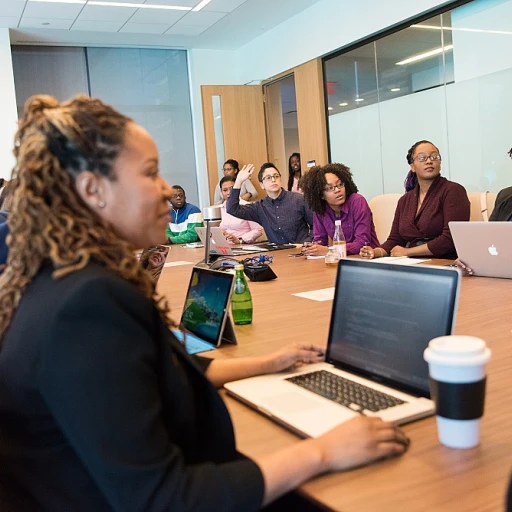
Understanding the Role of a Leadership Development Consultant
Exploring the Impact of Leadership Development Consultants
In fostering a thriving environment for businesses, leadership development consultants play an instrumental role. These professionals are dedicated to enhancing the quality and efficacy of leadership within organizations, thereby positively impacting employee retention rates. Without the continuous evolution of leadership skills, even the best intentions can become stymied by stagnant practices. Collaboration with a leadership consultant can profoundly influence the performance and morale of both individual leaders and their teams. By employing tailored consulting services, organizations can identify leaders who possess the potential to motivate and inspire, addressing any leadership gaps that may hinder progress. A development consultant not only provides fresh perspectives on strategy, but also delivers targeted training and executive coaching designed to cultivate a high-performing leadership team. Effective leadership development involves more than just sporadic training sessions. It requires a comprehensive approach that includes ongoing learning development, executive coaching, and systematic change management strategies. In the United States and beyond, companies have begun to realize the importance of investing in these services to ensure sustained business growth and enhanced employee satisfaction. By integrating strategies such as performance evaluation and customized leadership training, organizations can lay a robust foundation for retaining their most valuable asset: their people. For further insights into the role of leadership development in business environments, exploring essential questions for medical billing interviews can provide a unique perspective on tailored consulting approaches. Understanding how to best support leaders as they evolve is critical to the continued success of any company. This holistic approach employed by development consultants is fundamental in crafting leaders who excel in both strategy and execution, ultimately benefiting the entire organization.The Connection Between Leadership and Employee Retention
Linking Leadership to Employee Longevity
In today's competitive business environment, companies are increasingly recognizing the pivotal role of strong leadership in fostering employee retention. One might wonder, how does effective leadership directly influence an individual's decision to remain with an organization? The answer lies in the cohesive connection between adept leaders, organizational culture, and employee satisfaction. Effective leaders possess the ability to inspire, motivate, and guide their teams towards shared goals. Their leadership style creates an environment where employees feel valued and appreciated, which is a key driver for retention. Employees who work under successful leaders experience better job satisfaction, are more engaged in their work, and demonstrate enhanced performance. These factors collectively contribute to reducing turnover rates. Moreover, leadership development focuses on equipping leaders with essential skills such as communication, emotional intelligence, and change management. This ongoing learning and growth not only enhances the leader's capabilities but also translates into a more adaptive and supportive workplace environment. Regular coaching and development opportunities signal to employees that the company is invested in their professional growth, significantly boosting morale and loyalty. Thus, leadership consulting services play a crucial role in cultivating a high-performing organization. By working closely with a development consultant, companies can tailor their strategy to identify specific leadership gaps, ensuring that the leadership team is well-prepared to address diverse challenges and opportunities. This targeted approach ensures that leaders at all levels, including mid-level managers and executives, are equipped to foster a culture where employees thrive. For organizations striving to enhance their retention metrics, understanding the symbiotic relationship between leadership development and employee retention is essential. Delving deeper into this subject, one can explore how the responsibilities and impact of a front office manager extend beyond mere operations and contribute significantly to http://www.employee-retention.net/blog/understanding-the-role-of-a-front-office-manager-key-responsibilities.Strategies for Effective Leadership Development
Developing Leadership Skills for Retention
In the quest to enhance employee retention, focusing on leadership development is crucial. A well-structured leadership development strategy can transform managers into effective leaders who inspire and retain their teams. Here are some strategies that organizations can implement to foster leadership skills and improve retention rates:
- Customized Leadership Training: Tailor leadership training programs to address the specific needs of your organization. This approach ensures that leaders acquire relevant skills that align with the company's goals and culture.
- Executive Coaching: Engage in executive coaching to help leaders refine their skills. This personalized approach allows leaders to receive feedback and guidance, enhancing their ability to lead effectively.
- Mentorship Programs: Establish mentorship programs where experienced leaders guide mid-level managers. This not only aids in skill development but also fosters a culture of learning and growth within the organization.
- Leadership Workshops: Conduct workshops that focus on key leadership competencies such as change management, communication, and decision-making. These workshops can be instrumental in building a high-performing leadership team.
- Continuous Learning Opportunities: Encourage leaders to engage in continuous learning through seminars, webinars, and courses. This commitment to learning keeps leaders updated on the latest trends and strategies in leadership development.
By implementing these strategies, organizations can create a robust leadership pipeline that not only enhances performance but also boosts employee retention. For more insights on effective employee retention strategies, you can explore this resource.
Identifying Leadership Gaps in Your Organization
Spotting Leadership Gaps: A Key to Retention
Identifying leadership gaps within your organization is crucial for enhancing employee retention. A leadership development consultant can play a pivotal role in this process by assessing the current leadership landscape and pinpointing areas that require improvement. This assessment is not just about evaluating the skills of current leaders but also about understanding the needs of the team and the organization as a whole.
One effective strategy is to conduct a thorough analysis of the existing leadership team. This involves evaluating the performance of leaders at various levels, from executive to mid-level managers. By doing so, a business can identify which leaders excel and which may need additional support or training. This analysis should also consider the specific leadership skills that are critical for the organization's success, such as change management, strategic thinking, and effective communication.
Another approach is to gather feedback from employees through surveys or interviews. This feedback can provide valuable insights into how leadership is perceived within the company and highlight areas where leaders may be falling short. Engaging employees in this process not only helps in identifying gaps but also fosters a culture of open communication and continuous improvement.
Once gaps are identified, the next step is to implement targeted leadership development programs. These programs should be tailored to address the specific needs of the organization and its leaders. They may include executive coaching, leadership training workshops, or development coaching sessions. The goal is to equip leaders with the necessary skills and strategies to effectively guide their teams and drive the company forward.
Incorporating these strategies can significantly improve leadership performance and, in turn, enhance employee retention. By addressing leadership gaps, organizations can create a more supportive and motivating work environment, ultimately leading to a high-performing team and a successful business.
Case Studies: Success Stories in Leadership Development
Real-World Examples of Leadership Development Success
In the realm of leadership development, real-world examples provide invaluable insights into how effective strategies can significantly enhance employee retention. Here, we explore a few case studies that highlight the impact of leadership consulting and development on organizations.Transforming Leadership Skills in a Tech Company
A leading tech company in the United States faced challenges with high employee turnover, particularly among mid-level managers. By engaging a leadership consultant, the company implemented a comprehensive leadership training program. This initiative focused on developing essential leadership skills and executive coaching for managers. As a result, the organization saw a marked improvement in team performance and a significant reduction in turnover rates.Boosting Employee Engagement in a Retail Business
A retail business struggling with low employee engagement turned to leadership development consulting services. The development consultant identified key leadership gaps and introduced a change management strategy. Through targeted leadership training and development coaching, the company empowered its leaders to foster a more inclusive and motivating work environment. This approach not only improved employee satisfaction but also enhanced overall business performance.Enhancing Executive Leadership in a Financial Institution
A financial institution sought to strengthen its executive leadership team to drive business growth. By partnering with a leadership consulting firm, the organization implemented a tailored executive leadership program. This program focused on refining leadership skills and fostering a culture of continuous learning and development. The initiative helped the company retain top talent and achieve its strategic goals. These case studies underscore the importance of leadership development in retaining employees and driving organizational success. By investing in leadership consulting and training, companies can build high-performing teams and create a positive work environment that supports long-term growth.Future Trends in Leadership Development and Employee Retention
Emerging Trends Shaping the Future of Leadership Development
In the dynamic landscape of business, leadership development is constantly evolving to meet new challenges and opportunities. As organizations strive to enhance employee retention, understanding future trends in leadership development can provide valuable insights for leaders, managers, and development consultants.- Emphasis on Emotional Intelligence (EI): The future of leadership consulting is expected to place greater emphasis on emotional intelligence. Leaders are increasingly required to manage not only their own emotions but also empathize with their team members. The development of EI skills can significantly impact team morale and productivity, fostering a workplace environment conducive to heightened performance and retention.
- Digital and Remote Leadership Training: As remote work becomes more prevalent, businesses are relying on digital platforms for leadership training. Virtual learning environments offer flexibility, enabling executives and mid-level managers to access training materials anytime, anywhere. This transition to online services is crucial for companies aiming to maintain a high-performing leadership team in a remote work setting.
- Coaching and Mentoring Focus: Development coaching is evolving, with a heightened focus on personalized coaching and mentoring. Executive coaching will continue to be a vital component in cultivating new leaders while offering current leaders the opportunity to refine their skills. This personalized guidance helps leaders adapt to their roles and achieve their potential, which can result in improved organizational outcomes.
- Leadership in Change Management: As businesses face rapid technological and cultural shifts, leaders must become adept at managing change. This requires leadership teams to undergo change management training, equipping them with the skills needed to lead teams through transitions and maintain company stability. Adaptive leadership is becoming an essential strategy for organizations navigating change.
- Diversity and Inclusion Initiatives: As diversity and inclusion become increasingly prominent business values, leadership development programs are being tailored to address these themes. Training that emphasizes the benefits of diverse perspectives not only enhances leadership skills but also promotes a more inclusive work environment.













